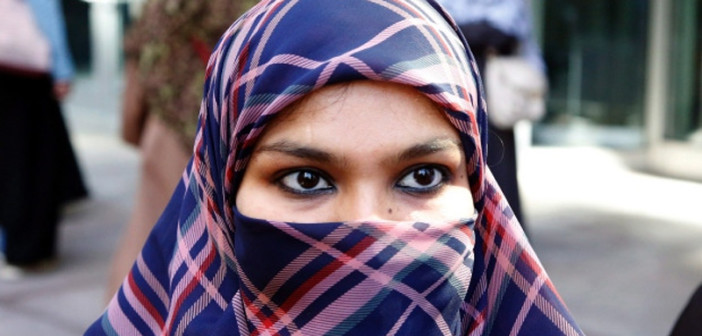The Federal Court of Appeal has denied the application for a stay of the Federal Court ruling in favor of Zunera Ishaq, clearing the way for her to wear a niqab during a citizenship ceremony.
Regulations have banned wearing of face veils at citizenship ceremonies, but Ishaq challenged the rule and won in Federal Court. On Sept. 18, the Federal Court of Appeal upheld that decision in a quick ruling from the bench. The federal government had sought a stay of the ruling and said it intended to appeal to the Supreme Court.
“I am pleased that the courts have reaffirmed my right to citizenship and to vote,” said Ishaq in a written statement issued to CBC News through the law firm of Waldman & Associates.
“I am disappointed with the government’s focus on my individual case when there is so much more that merits the attention of Canadians at this time,” Ishaq said. “I’m also disappointed that Mr. Harper continually twists the facts of my case for his gain.
“I wish to confirm that I will be identified without my veil for the purposes of the ceremony. This has nothing to do with identity and everything to do with my right — and the right of all Canadians — to think, believe and dress without government interference,” she said.
Before reciting the oath, would-be Canadians are required to provide multiple proofs of identity. Those who wear face coverings must remove them before the ceremony in private before a citizenship official.
Ishaq is one of two women who have refused to unveil before taking the citizenship oath since the Conservatives introduced the policy directive in 2011.
Conservative Party Chris McCluskey said in an email, “We are disappointed in the court’s decision, especially as we were waiting on the Supreme Court to hear our appeal.
“We have committed to rectifying this matter going forward by introducing legislation that will require one to show their face while swearing the oath of citizenship. Legislation will be introduced within the first 100 days of a re-elected Conservative government.”
“At this point, the Federal Court of Appeal has made a clear statement that there’s no basis to grant them a stay, that they upheld their previous ruling that this case has nothing to do with the niqab,” said Lorne Waldman, Ishaq’s lawyer.
“It’s an issue from the rule of law, and the minister acted illegally in creating a policy that went contrary to the legislation, and that’s what this case is about.”
The Department of Citizenship and Immigration must formally invite Ishaq to attend a ceremony. Several are scheduled in Ontario between now and the Oct. 19 election.
In the court case, federal government lawyers made a number of arguments — none of which related to the need to verify one’s identity.
For that matter, none echoed Harper’s insistence that the niqab should be banned during citizenship ceremonies because it is contrary to Canadian values and “rooted in a culture that is anti-women.”
They argued that Kenney’s policy directive is not mandatory but just a non-binding guideline that citizenship judges are free to ignore.
And they maintained the policy was created due to concerns that some citizenship candidates were not actually reciting the oath and, therefore, that their mouths needed to be visible during the ceremony.
Justice Boswell concluded, however, that the wording of the directive in the citizenship ceremony policy manual left no discretion to citizenship judges, stipulating that candidates are “required” to remove face coverings and that the citizenship certificate “is NOT to be presented” if a candidate refuses.
He also found that the directive conflicted with regulations which require citizenship judges to administer the oath “with dignity and solemnity, allowing the greatest possible freedom in the religious solemnization or solemn affirmation thereof.”
Boswell noted that the regulations require oath takers to subsequently sign a certificate certifying that the oath has been taken, counter-signed by the official who administered the oath.
Given that, he concluded that requiring a person to be seen to be taking the verbal oath “does appear to be superfluous.”
Furthermore, he said it “would make it impossible not just for a niqab-wearing woman to obtain citizenship but also for a mute person or a silent monk.”
“I agree with the applicant (Ishaq) that it is the candidate’s signature beneath this written oath or affirmation of citizenship, rather than visual confirmation of the candidate saying the oath, that is the only proof needed that a candidate has sworn or affirmed the oath of citizenship,” Boswell concluded.




